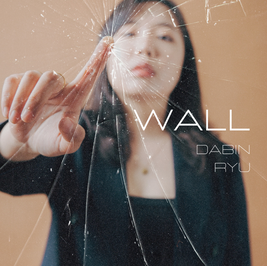
The 10 songs on Wall were all written by Dabin. She moves effortlessly from trio to quintet to nonet and gives us one track of piano with vocals by Anthony Marsden and one track of solo piano. She shows many facets of her skills and proclivities. Her classical orientation comes through with the written-out pieces like Wall (Pt. 1) and Wall (Pt.2). Then she displays her Jazz proficiency with hard bop and improvisational fluidity. This flexibility reflects the character and experience of who Dabin Ryu truly is. She is a gifted composer and arranger and improviser.
The artists with her center around herself on piano, Benjamin Young on bass, and Willis Edmundson on drums. Joining the core trio on various tracks are Fernando Ferrarone on trumpet, Jack Kotze on trombone, Nathan See and Zoe Obadia on alto sax, Boyce Griffith on tenor sax, Jarod Apple on baritone sax, and Kevin Scollins on guitar.
It is the nonet and The Light that kicks the album off. The large ensemble arrangement is well-conceived and sharply executed. Dabin’s piano solo gives a great foretaste of what more will follow in the album. That foretaste is not disappointed with the quartet format of I’ll Never Know and the fascinating changes and structures. The hard drive of the rhythm section propels the cool guitar of Kevin Scollins.
The sextet with trumpet, alto and tenor saxes follows with Temple Run. The hard bop is brilliant and the musicians show off the depth of their talents with aplomb. Pay attention to Edmundson on drums.
After the written-through Wall (parts 1&2), the quintet brings back the improv for Moon. With Nathan See and Zoe Obadia on alto saxophones, their duet call and response opens the way for Dabin’s piano with a nearly Saint-Saens approach to harmonics and textures. Enter bass and drums and the full Jazz flow is opened up. Wonderful.
Stillborn is the only solo piano piece on the album. It is a bit haunting, perhaps even melancholic, but the song is delicately liquid and movingly tender. Then the alto sax quintet returns with its precision and prowess for Suspicion. The quirky tempo and spot-on delivery is excellent.
Taxi Driver is the longest piece on the album with only the core trio taking on the evocative imagery. So well done. It very well may be my favorite track on this splendid album. The album closes with We Will Meet Again and the alto sax quintet. Benjamin Young’s bass gets the intro and the piano and drums join in for the opening ride before the alto saxes come crashing in. You to love the harmony of those saxes atop the drive of bass and drums. But it is Dabin who gets the attention and deservedly so. By the end of the album, you come to expect the outstanding from Dabin and she does not disappoint. Not once.
Dabin Ryu’s Wall is a fierce and fluid album that crosses style and format with the ease of the most seasoned pianists and composers. For any album, it is remarkable. For a debut album, it is wonderful.
~Travis Rogers, Jr. is The Jazz Owl
 RSS Feed
RSS Feed
